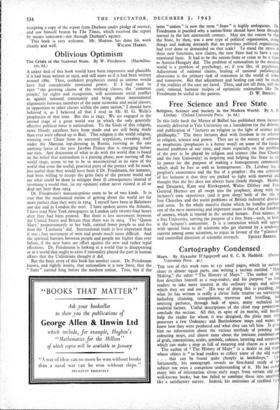Oblivious Optimism
A GREAT deal of this book would have been impressive and plausible if it had been written in 191o, and still more so if it had been written around 1SSo. Then, confident prophecies stated as axioms would have had considerable emotional power. If I had read in 1910 " the growing claims of the working classes, the ' common people,' for rights and recognition, will accentuate social conflict as against national community and bring about international alignments between members of the same economic and social classes, in opposition to other classes within the same nation," I should have believed it, as I believed all that I read in Mr. H. G. Wells's prophecies of that time. But this is 1943. We are engaged in the second stage of a great world war in which the only generally effective political force is nationalism. To the Gods of this religion, more bloody sacrifices have been made and are still being made than ever were offered up to Baal. This religion is the world religion, winning over China from its ancestral scepticism, revealing itself under the Mandan top-dressing in Russia, reviving as the one unifying force of the new Jacobin France that is emerging before our eyes. Any discussion of what to do with the world that is based on the belief that nationalism is a passing phase, now moving off the world stage, seems to me to be so misconceived in its view of the world that even the useful, practical parts of the project will be much less useful than they would have been if Dr. Friedmann, for instance, had been willing to accept the grim facts of the present world and see what could be done to mitigate their ill consequences instead of inventing a world that, (in my opinion) either never existed at all or died not later than 1914.
Dr. Friedmann's misconceptions seem to be of two kinds. It is true that the mechanical means of getting about the world are far more perfect than they were in 1914. I myself have been in Baltimore one day and in London the next. I have spoken across the Atlantic, I have read New York newspapers in London only twenty-four hours after they had been printed. But there is less movement between the United States and Britain than there was in 1914. The ' Queen Mary,' proportionately to her bulk, carried fewer people to and fro than the Lusitania ' did. International trade is less important than it was ; free movement of men and goods much more difficult. And the spiritual barriers between people and people are higher than ever before, if the new hates are offset against the new and rather tepid affections. Dr. Friedmann is looking at a world that is disappearing or at a world that ought to exist if rationality played the part in human affairs that the Utilitarians thought it did.
But the basic error of this book has another cause. Dr. Friedmann knoWs, and rightly insists, that nationalism is a new force, that the " State " existed long before the modern nation. True, but if the
term " nation " is new the term " State " is highly ambiguous. Dr. Friedmann is puzzled why a nation-State should have been thought normal in the late nineteenth century. May not the reason be that the State; by then, was a new type of political organisation, doing things and making demands that no previous political organisation had ever done or demanded on that scale? To stand the strain of these new functions, new claims, the new State had to have a new emotional basis. It had to be the nation-State or cease to be a State as Austria-Hungary did. The problem of nationalism in the modern world -is a problem of psychology, or, if you like, of psychiatry, Adjustment of national claims, healing of national pathological obsessions is the primary task of statesmen in the world of today and tomorrow. But that adjustment and healing can only be made if the realities of the case are faced.. Then, and not till then, will the cool, rational,' humane recipes of optimistic rationalists like Dr.


























 Previous page
Previous page